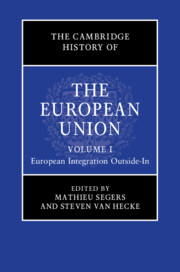Book contents
- The Cambridge History of the European Union
- The Cambridge History of the European Union
- The Cambridge History of the European Union
- Copyright page
- Contents
- Figures
- Contributors to Volume I
- Acknowledgements
- Abbreviations
- Reflections on the History and Historiography of European Integration
- Part I Critical Junctures
- Part II Multilateralism and Geopolitics
- Part III Perspectives and Ideas
- Networks and Attitudes
- Thinking and Memory
- 21 Ideas of Europe: A View from Inside-Out, the 1880s to the 1910s (and Beyond)
- 22 Beginning with Culture: A Certain Idea of Europe
- 23 The European Union and Memory
- Culture and Religion
- Index
- References
22 - Beginning with Culture: A Certain Idea of Europe
from Thinking and Memory
Published online by Cambridge University Press: 21 October 2023
- The Cambridge History of the European Union
- The Cambridge History of the European Union
- The Cambridge History of the European Union
- Copyright page
- Contents
- Figures
- Contributors to Volume I
- Acknowledgements
- Abbreviations
- Reflections on the History and Historiography of European Integration
- Part I Critical Junctures
- Part II Multilateralism and Geopolitics
- Part III Perspectives and Ideas
- Networks and Attitudes
- Thinking and Memory
- 21 Ideas of Europe: A View from Inside-Out, the 1880s to the 1910s (and Beyond)
- 22 Beginning with Culture: A Certain Idea of Europe
- 23 The European Union and Memory
- Culture and Religion
- Index
- References
Summary
The ‘European project’ at first sight might seem a ploddingly pragmatic, even technocratic, instrument for achieving harmonisation between its member states. As such, it is habitually contrasted with the ‘nation-states’ which make up its members, and which, unlike the office blocks of Brussels and Strasbourg, are seen as historical communities (‘nations’) as well as states, united in their shared historical memories, language and culture. This unproblematic acceptance of the ‘nation-state’ makes for a skewed comparison when used in a problematisation of ‘Europe’. There seems to be little that Europe can offer by way of a common cultural bonding agent; at best, there is a notion of ‘unity in diversity’ (the official motto of the European Union (EU) since 2000). Indeed, the Treaty of Maastricht included a cultural paragraph which uneasily balanced the requirements of that cultural diversity and unity. The uncertainty concerning a common cultural basis is even seen as a characteristic weakness in the European project, something that deprives it of a centripetal, cohesive force. Its absence means that the EU is perpetually and self-consumingly in quest of a self-definition and, in Cris Shore’s formulation, lacks an identifying focus ‘to capture the loyalty and allegiance of its would-be citizens; to transform nationals into self-recognising European subjects’. Shore has also traced, in the mode of cultural anthropology, the corporate culture of the EU institutions, rather than analysing a cultural history or cultural agenda informing the European project.
- Type
- Chapter
- Information
- The Cambridge History of the European Union , pp. 561 - 590Publisher: Cambridge University PressPrint publication year: 2023

